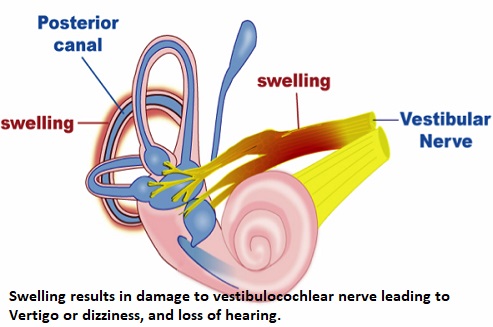About Labyrinthitis Disease
Labyrinthitis results from an infection of the inner ear. This inflammation results in damage to the vestibulocochlear nerve leading to Vertigo or dizziness, and loss of hearing. The inner ear consists of sacs and fluid-filled canals; this system is called labyrinth. Balance and Hearing are the critical functions of the labyrinth. The cochlea, a fluid-filled, snail-shaped structure is responsible for hearing. The Vestibular part of the inner ear controls balance It consists of three semicircular canals (which have fluid and hair cells)along with to sac-shaped structures the utricle and saccule these organs give information about the head movements. The signals travel from the labyrinth to the brain via the vestibulocochlear nerve.
The vestibulocochlear nerve is the eighth cranial nerve and has two sections. One, the cochlear nerve that transmits signals regarding hearing and the other, the vestibular nerve that sends signals regarding balance. The brain integrates the signals transmitted by vestibular nerves of both ears to maintain balance. Labyrinthitis disrupts both cochlear and vestibular components of the inner ear.Thus, it affects both hearing and balancing abilities of the person, causing loss of hearing and disequilibrium or vertigo.

Signs & Symptoms
- Vertigo – intense bouts of spinning lasting hours to days.
- Hearing loss in the affected ear.
- Tinnitus or ringing in one ear – persistent.
- Giddiness or unsteadiness.
- Nausea/Vomiting.
- Difficulty in focusing eyes during head movement.

Diagnosis
Some vestibular tests like VNG, CCG, SVV and DVA along with audiometry will be required to arrive at the correct diagnosis of the condition.
Treatment
Your doctor may prescribe drugs that can reduce dizziness and nausea, and sedatives to allay the anxiety. These medicines should be given only for a short duration, that is, not more than three days. Vestibular rehabilitation should be started at the earliest to get optimum results and achieve central compensation.
